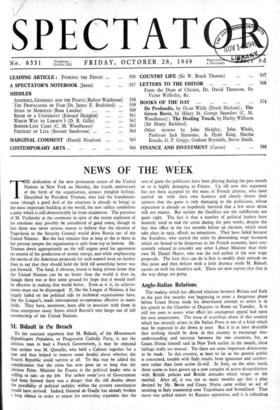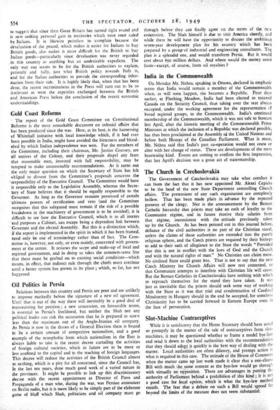Anglo-Italian Relations
The malaise which has affected relations between Britain and Italy in the past few months was beginning to enter a dangerous phase before Count Sforza made his determined attempt to arrest it in his speech to the Chamber of Deputies in Rome on Tuesday. It is still too soon to assess what effect his courageous appeal had upon his own countrymen. The wave of scurrilous abuse of this country which has recently arisen in the Italian Press is not of a kind which may be expected to die down at once. But it is at least desirable that nothing should be done in this country to encourage mis- understanding and mistrust between the two countries, for, as Count Sforza himself said in New York earlier in the month, these failings really are mutual. Yet there are some important distinctions to be made. In this country, at least so far as the general public is concerned, trouble with Italy results from ignorance and careless- ness rather than from active ill-will. In Italy, on the other hand, there seems to have grown up a new complex of active dissatisfaction with British policies and British attitudes which verges on the morbid. After all, it was not so many months ago that a plan devised by Mr. Bevin and Count Sforza came within an ace of securing to Italy trusteeship over Tripolitania and Somaliland. That move was spiked mainly by Russian opposition, and it is ridiculous
to suggest that since then Great Britain has turned right round and is now seeking personal gain in territories which were once ruled by Italians. It is likewise pointless to -complain because the devaluation of the pound, which makes it easier for Italians to buy British goods, also makes it more difficult for the British to buy Italian goods—particularly since devaluation was never regarded .in this country as anything but an undesirable expedient. The only way out seems to be for the British authorities to explain, patiently and fully, just what British policy towards Italy is, and for the Italian authorities to provide the corresponding infor- mation from their side. It is highly likely that, when that has been done, the recent recriminations in the Press will turn out to be so irrelevant as were the asperities exchanged between the British and American Press before the conclusion of the recent economic understandings.







































